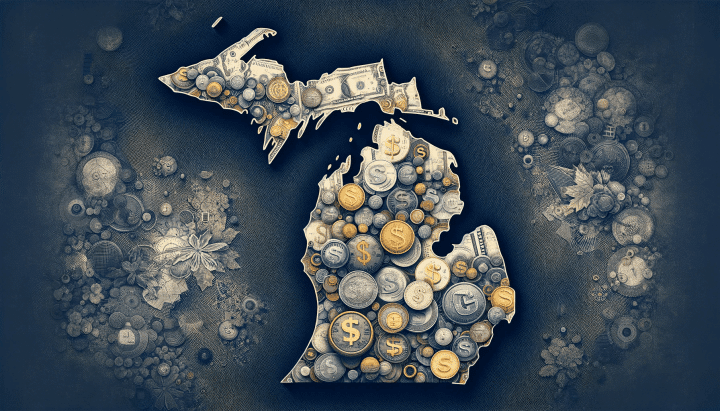
Excessive debt? Take this quiz to find the best solution for you.
Are you a Michigander grappling with the weight of unsecured debt?
If so, you're not alone.
In today’s economic climate, many Michigan residents find themselves navigating the challenging waters of debt, especially unsecured debt — the kind that isn't secured by assets like homes or cars.
Today we'll explore practical debt relief options to empower you with knowledge to regain control of your finances. Whether it's credit card bills, personal loans, or medical expenses, there's a path to a more stable financial future in the Great Lake State.
Understanding unsecured debt in Michigan
What exactly is unsecured debt?
Simply put, it's debt that's not backed by any physical asset. Unlike a mortgage or car loan, where your house or vehicle serves as collateral, unsecured debt is based purely on your promise to pay. Examples include credit card debts, personal loans, and medical bills.
This article focuses entirely on unsecured debt.
In Michigan, the average credit card debt of $4,692 and the average personal loan debt is $11,281. Although technically not an unsecured debt, the average student loan debt in Michigan is $36,642.
In the following sections, we'll explore how these debts accumulate, what Michigan-specific laws you should be aware of, and most importantly, what practical steps you can take to manage and overcome these financial hurdles.
Factors Contributing to Rising Unsecured Debt in Michigan
Unsecured debt in Michigan isn't just a random occurrence Several key factors contribute to this growing trend:
Navigating Michigan's Debt Laws and Regulations
Understanding Michigan's debt laws is important for managing excessive unsecured debt. Here's what you need to know:
FAQs for Michigan Residents in Debt
Here are some frequently asked questions about debt (and debt relief) for Michigan residents:
- Can I be sued for unsecured debt in Michigan? Yes, you can be sued for unsecured debt. Creditors have up to 6 years to initiate a lawsuit for nonpayment of debt in Michigan. If a lawsuit is filed, it’s important to respond to avoid a default judgment.
- Are there government debt relief programs in Michigan? Direct government debt relief programs for unsecured debt are rare. However, Michigan residents can seek assistance from nonprofit credit counseling agencies or explore government-backed programs for specific types of debt like student loans.
- How does debt settlement affect my credit score? Debt settlement typically has a negative impact on your credit score. This is the trade-off for significant debt relief without having to file bankruptcy.
- What protections o I have against harassing debt collectors? The Fair Debt Collection Practices Act protects you from harassment and unfair practices by debt collectors. You can sue for damages if these laws are violated.
- Can unsecured debt lead to wage garnishment in Michigan? Yes, if a creditor wins a lawsuit against you, they can seek wage garnishment as a method of debt repayment. Michigan law limits the amount that can be garnished to protect your ability to cover essential expenses.
- What should I do if I can’t afford to pay my debt? If you’re unable to pay your debt, consider contacting a credit counselor for advice on managing your debt. You may also explore debt consolidation, debt settlement — or as a last resort, bankruptcy.
- Can creditors seize my property in Michigan? Creditors can place liens on property or seize assets to satisfy debts, but there are protections and exemptions in place. For example, certain types of income like Social Security benefits are exempt from garnishment.
Knowledge is power. If you're dealing with debt, it's important to be informed and seek professional advice when needed.
Local Michigan Resources and Assistance
Michigan offers a variety of local resources to assist residents in managing and overcoming debt:
- Nonprofit Credit Counseling Agencies: Organizations such as GreenPath Financial Wellness, headquartered in Farmington Hills, provide free or low-cost counseling services. They can help with debt management plans, budgeting, and financial education.
- Legal Aid Services: For legal assistance, particularly if facing a lawsuit from creditors, Michigan Legal Help and Legal Services of Eastern Michigan offer resources and guidance, often at no cost for qualifying individuals.
- Community Assistance Programs: Local community organizations, such as the Michigan Community Action Agency Association, offer various forms of assistance, including financial counseling and emergency aid for those in financial distress.
- University-Based Programs: Universities like Michigan State University and the University of Michigan offer financial education and counseling services through their extension programs and student services.
- State Government Resources: The Michigan Department of Insurance and Financial Services provides information on managing debt, understanding credit, and filing complaints against unfair lending practices.
- Debt Management Programs: Accredited agencies like the National Foundation for Credit Counseling (NFCC) have member agencies in Michigan that offer debt management programs, which can help reduce interest rates and consolidate debt payments into a single monthly amount.
- Financial Literacy Workshops: Local libraries and community centers often host free workshops and seminars on financial literacy, budgeting, and debt management. These can be valuable for gaining practical knowledge and skills
Conclusion
Navigating the complexities of unsecured debt in Michigan can be challenging, but it's not insurmountable.
With the right information and tools, you can take control of your financial situation and pave the way toward a more stable and secure future.
Understanding your debts, exploring available debt relief options, and making informed decisions based on Michigan-specific laws and resources are key steps in this journey. Don't hesitate to seek professional advice and utilize the local resources available to you.
Most importantly, maintain patience and perseverance. Managing debt is a process that requires time, discipline, and commitment. Every step you take towards debt reduction is a step towards financial freedom.
